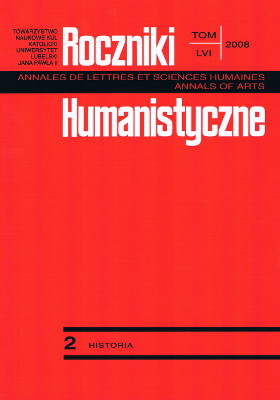Emigracyjni przywódcy Stronnictwa Pracy wobec sanacji w pierwszych miesiącach II wojny światowej
Abstrakt
The first months of the Polish authorities in exile saw a conflict between the activists of the Working Party and the “sanacja” political milieu. Karol Popiel and Izydor Modelski were staunch advocates of limiting the influence of the “sancja” regime on the political life of the country and emigration. It was manifested by the establishment of a commission and its works on the causes of the failure of the September campaign. The politicians of the Working Party shouldered the responsibility for the Polish-German clash on the members of the pre-September ruling authorities. Another area of conflict was the Committee of Ministers for the Affairs of the Country. It was a body competent for the leading of the underground struggle in occupied Poland. In the initial stage of the committee conducted by General Kazimierz Sosnkowski, who was linked with the milieu of the “sanacja” regime, attempts were made to keep a representative of the Working Party at a distance. This was connected with the then political competition between the Alliance of Armed Fighting (with some potent influences of the “sanacja” regime) and the Central Committee of Independence Organisations (with the leading position of the Working Party) for a leading function in the Polish underground state. In this case confrontation ended with a peculiar compromise – CKON ceased to function, and a representative of the Working Party became a permanent member Committee for the Affairs of the Country.
Bibliografia
Aksamitek S., Generał Józef Haller. Zarys biografii politycznej, Katowice 1989.
Duraczyński E., Kontrowersje i konflikty 1939-1941, Warszawa 1979.
Duraczyński E., Rząd Polski na uchodźstwie 1939-1945. Organizacja, personalia, polityka, Warszawa 1993.
Giedroyc J., Wprowadzenie do raportu Modelskiego „Wojskowe przyczyny klęski wrześniowej (Próba syntezy)”, „Zeszyty Historyczne” 1990, nr 92.
Hułas M., Goście czy intruzi? Rząd polski na uchodźstwie wrzesień 1939 - lipiec 1943, Warszawa 1996.
Korpalska W., Władysław Eugeniusz Sikorski. Biografia polityczna, Wrocław 1981.
Monasterska T., Popiel Karol, w: Polski Słownik Biograficzny, t. XXVII, s. 558-562.
Pobóg-Malinowski W., Najnowsza historia polityczna Polski, t. II, Londyn 1967.
Turowski K., Historia ruchu chrześcijańsko-demokratycznego w Polsce, Warszawa 1989.
Władze RP na obczyźnie podczas II wojny światowej 1939-1945, red. Z. Błażyński, Londyn 1994.
Copyright (c) 2008 Roczniki Humanistyczne

Utwór dostępny jest na licencji Creative Commons Uznanie autorstwa – Użycie niekomercyjne – Bez utworów zależnych 4.0 Międzynarodowe.





